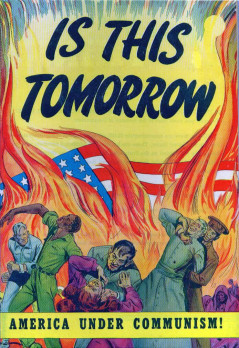Archived Veranstaltung
Appel à communication
Series of conferences and seminars 2023-2024
Fribourg (30.11-01.12.2023), Rome (January 2024), Paris (June 2024)
(illustration: Cover to the propaganda comic book : Catechetical Guild, Is This Tomorrow, 1947. http://commons.wikimedia.org/wiki/File:Is_this_tomorrow.jpg)
FROM the first condemnation of communism in the Encyclical Qui Pluribus (1846) to the excommunication decrees of 1949, 1950 and 1959, anticommunism seems to be a fundamental reflex of the Catholic Church. Its manifestations range from theology to devotional practices, through the commitments of Christian parties and trade unions. This complex and massive phenomenon has not yet been addressed by historical research in any depth. Taking advantage of the opening of the archives of the pontificate of Pius XI (1922-1939) in the early 2000s, a few monographs detail the conflicting relationship between Catholicism and communism over a long period, going beyond the local or national perspective (Chenaux 2009, reedited 2021; Pettinaroli 2015; Chamedes 2019). While studies have been carried out on crises, personalities or movements (McNamara 2005; Fejérdy 2008; Roulin 2010; Cœuré 2014), many spaces and actors still await to be studied.
Catholic anticommunism needs to be looked at with a fresh look after the opening of the archives of the pontificate of Pius XII (1939-1958). As part of the ANR GLOBALVAT project (2022-2025, École française de Rome-Laboratoire de recherches historiques Rhône Alpes) and developed through a partnership with the University of Fribourg and the University of Paris 1 Panthéon-Sorbonne, this series of colloquia and seminars aims to stimulate research in these newly available archives. The two decades 1940 and 1950 are pivotal: the Roman Magisterium took important positions in a context where important Catholic communities experienced a communist system for the first time, while former Catholic parties were absorbed into Christian Democrat movements in the West and were confronted with the parties of the left on a daily basis.
The series addresses the relationship between Catholicism and anticommunism in a broad geographical, thematic and chronological perspective. Far from being limited to Europe, it will welcome contributions from other continents. The cycle will consider not only Catholic actors, clergy and laity, but also other religious denominations, as well as initiatives either seeking to counter communism or to reconcile, if not merge, with it. In light of the new Cold War Studies, it will focus not only on political aspects, but also on visual cultures, the role of 'small' states and non-governmental organisations. It will consider the cultural networks and institutions that helped shape societies and politics in the Cold War era. Finally, in terms of chronology, other periods may be addressed: the aim is to place this pontificate in the long term, from the 19th century to the end of the Cold War, and even beyond.
The series will therefore be organised along broad thematic lines, ranging from diplomatic relations to doctrinal issues, including the relationship to the media, political parties, trade unions, education, missions, the arts, other denominations and decolonisation. Preference will be given to unpublished contributions, based on new sources.
Organisé par
Fabien Archambault (Université Paris 1 Panthéon-Sorbonne), Laura Pettinaroli (École française de Rome), Stéphanie Roulin (Université de Fribourg)
Lieu de l'événement
Fribourg
Av. de l’Europe 20
1700
Fribourg
Langues de l'évènement
Allemand
Français
Italien
Anglais
Informations supplémentaires sur l'événement
Site web de la manifestation
Coûts de participation
CHF 0.00
